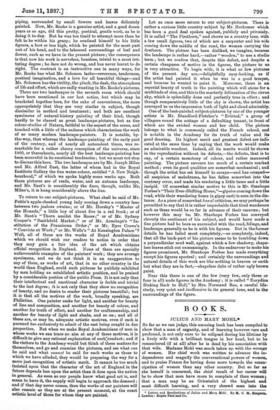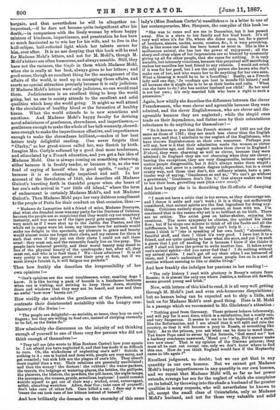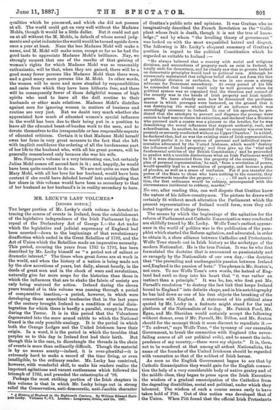BOOKS.
JULIUS AND MA.RY MORI,*
So far as we can judge, this amusing book has been compiled to show that a man of sagacity, and of learning however rare and profound, is not only sure to be eclipsed during his lifetime by a lively wife with a brilliant tongue in her head, but to be remembered (if at all) after he is dead by his association with that wife. Madame Mohl was much taken up with the wrongs of women. Her chief work was written to advance the in- dependence and magnify the conversational powers of women, and to praise France for having done more towards the eman- cipation of women than any other country. But so far as she herself is concerned, the chief result of her career will be to show that men have more to complain of than women; that a man may be an Orientalist of the highest and most difficult learning, and a very shrewd man into the • Letters and Rsoollsctions of Julius and Nary Kohl. By IL. 0. ids Bilinfoolls London: Hagan Pind and Co.
bargain, and that nevertheless he will be altogether nn- important,—if he does not become quite insignificant after his death,—in comparison with the lively woman by whose happy mixture of kindness, impertinence, and penetration he has been so much fascinated as to win her for his wife, and to live in the half-eclipse, half-reflected light which her talents secure for him, ever after. It is no use denying that this book will be read for Madame Molars letters, and not for M. Mohl's, though M. Mohl's letters are often humorous, and always sensible. Still, they have not the raciness, the tingle in them which Madame Mohl, when she is really at her best, always gives to her letters ; and good eenee, though an excellent thing for the management of the affairs of the world, is used up in managing those affairs, and exerts no special attraction precisely because it is only judicious. If Madame Mohl's letters were' only judicious, no one would read them. judiciousness is an excellent thing to keep the world going, but no one in society attends to the excellent and solid qualities which keep the world going. It might as well attend to the circulation of healthy blood or the formation of healthy tissue. What the world attends to is new sensations and emotions. And Madame happy faculty for devising novel admixtures of gentleness, shrewdness, and impertinence,— gentleness enough to make the whole of her talk womanly, shrewd- ness enough to make the impertinence effective, and impertinence enough to make the shrewdness brilliant,—makes of her best letters truly delightful reading. One never forgets that Clarky," as her great-nieces called her, was Scotch by birth. Imagine Mrs. Carlyle softened by a good deal more tenderness, and stimulated by a French education, and you get a fair idea of Madame Mohl. One is always coming on something charming, either because it is freshly tender, or because it is, as she was fond of saying of herself when in good spirits, "cocky," or because it is so charmingly impatient and nalf. In her account of the Revolution of 1848, she describes old Madame Guizot's bursting forth in thankful prayer when she hears of her son's safe arrival in "our little old island," where the term of endearment is certainly Madame Mohl's, and not Madame Gnizot's. Then Madame Mohl pays her very dubious compliment to the people of Paris for their conduct on that occasion, thus :—
"Madame de Lamartine told a friend of mine, Madame Desroyes, that what she dreaded most was any party for the Duchess of Orleans, because the people are so suspicious that they would cry out treachery instantly, and woe unto us if the tiger party gets uppermost. I feel very much as if I were shut up in the Jardin des Plantee, and the whole set in cages were let loose, my intense love for animals would make me delight in the spectacle, my pleasure in grace and beauty would almost make me forget their claws, and ray esteem for them is such that even if they put out their claws I could not call them cruel they must eat, and the retractile family live on live prey. The people have behaved prettily, and their moral beauty may stand in lieu of the physical beauty of the quadrupeds; but, after all, they most eat, and who is to feed them ? We—their admirers ? It is all very pretty to see them growl over their prey at first, but if we mast always furnish it, it will fatigue our pockets."
Then how freshly she describes the irrepressibility of her own opinions !—
"One's opinions are the most troublesome, noisy, snarling dogs I know. It is like having a pack of hounds in a handsome bedroom when one is visiting, and striving to keep them down, shutting doors and windows that they may not be heard, and now and then an awful 'bow-wow' Mints out !"
How vividly she catches the gentleness of the Tyrolese, and contrasts their disinterested sociability with the hungry com- placency of the Swiss I-
" The people are delightful—so sociable, so tame, they hop on one's fingers ; but they are willing to feed one, instead of chirping eternally to be fed, as the Swiss do.'
How admirably she discourses on the iniquity of not thinking enough of yourself to one of those very few persons who did not think enough of themselves !—
" Pray tell me (she wrote to Miss Bonham Carter) how your sprain
is. I am afraid you have neglected it, and that has made it so difficult to cure. Oh, the wickedness of neglecting one's self ! Suicide is
nothing to it ; one is buried and done with, people are very sorry, and get consoled; but sick folk are the plague of one's life. They absorb more capital than a war. Their relations are generally annihilated; and then the money! the doctors ! the rubbers ! the water-packers, the travels, the lodgings at watering-places, the bottles, the gallipois, the plaisters, the blisters, the powders, the pill-boxes, the night-lamps, the saucepans the messes, graels, semolina& tapiocas! I could commit suicide myself to get out of their way! wicked, cruel, extravagant, selfish, absorbing wretches. Adieu, dear Coo; take care of yourself; don't take care of other folk. Care killed a cat ; I dare Bay it was 'cause the cat took care of her kittens instead of herself."
And how brilliantly she descants on the enormity of this same lady's (Mies Bonham Carter's) unselfishness in a letter to one of her contemporaries, Mrs. Simpson, the compiler of this book !--•
" She was to come and see me in December, but it has passed away. She is a slave to her family and her kind heart. It's all very well when it's for Flo, whom she dotes upon, but for a parcel of brothers, sisters, uncles, aunts, cousins, &o., it is very provoking. She is like some one that has been boned as meat is. She is like a molluecons animal, she has lost the power of enjoyment ; all the sharp and crisp edges of her impressions are so blunted by constantly giving up all for other people, that she cares for nothing. It is very amiable, but intensely vexatious, because this perpetual self -sacrificing makes her sacrifice her best friend to any relation. I would not mind. if it was for her good, but I am the only person she knows who don't make use of her, and who wants her to do anything for her own sake. What a blessing it would be to be a foundling ! Really, as a French lady said one day, ‘Je voadrais qua tout In monde flit batard f and all because she is single she is to be at their backs and calls. 'What can she have to do P she has neither husband nor child.' So her sou/ is not her own ; it's only married folk who have a right to each a possession."
Again, how wittily she describes the difference between the clever Frenchwomen, who were clever and agreeable because they were admired, and the clever Englishwomen, who are clever and dis- agreeable because they are neglected ; while the stupid ones trade on their dependence, and flatter men by their ostentatious reluctance to do anything for themselves I-
" Be it known to you that the French women of 1862 are not the same as those of 1762; they are much less clever than the English ones now, and that I attribute to the neglect of the Englishmen, who have thrown Englishwomen on their own resources. Perhaps you will say, how is it that their admiration made the women so clever two centuries ago, and that neglect makes them clever in England ? D'abord, they were charming as well as clever, because they were admired ; in England they are not charming when they are clever ; barring the exceptions, they are very disagreeable, because neglect makes people disagreeable, but it don't always make them stupid ; they study, and grow to a certain degree independent, but in a cross crusty way, and those that don't, the ordinary misses, have a par- ticular way of saying, Gentlemen no and so,' 'We can't go without a gentleman,' 'Gentlemen don't like it,' that always makes me long to box their base, grovelling ears (this entre nous)."
And how happy she is in describing the ill-effects of damping criticism :—
" I must not have a critic that is too severe, as they discourage me, and I throw it aside and can't work ; it is a thing not sufficiently considered, that animal spirits are the first ingredient for doing any- thing. Criticism entirely stops the current, at least with me. I'm convineed that is the reason why art is so brilliant at its birth. There are no critics. The artist goes on helter-skelter, enjoying his creations. The more sympathy he obtains, the quicker his ideas Row; but if he stops one minute to think of all the faults and all the indifference, he is iced, and he really can't help it. . . . . Some- times I think it" [she is speaking of her own book] "abominable, fanciful stuff, and then I think it's very good. I have lent it to a friend, and am quite quaking to hear what she says, and yet I'm such a goose that I put off sending for it because I knew if she thinks it stuff I shall not have the power to write another line. It takes away one's animal spirits—did you never find that ? I do nothing without my animal spirits. I can't get off my chair when I am bereaved of them, and I can't understand how some people live on in a sort of routine without seeming to like or dislike living."
And how frankly she indulges her passions in her reading !— " The only history I read with gluttony is Boney's return from Russia ; it is almost the only one where Justice, a tedious old dawdle, seems ground young and brisk."
Now, with letters of this kind to read, it is all very well getting through M. Mohl's just and even sub-humorous disquisitions ; but no human being can be expected not to skip a little, and look on for Madame Mohl's next good thing. Here is M. Mohl in a passage which we recommend to Mr. Gladatone's attention :
"Nothing good from Germany. Those princes behave infamously, and will pay for it next time, which is a satisfaction, but a costly one; and very dangerous. It seems to me to be the beginning of a strife like the Reformation, and I am afraid that it will split and rain the country, no that it will become a prey to Russia, or something like Italy. As to the princes, you ask what can be done to mend them. You know Pope used to swear by the formula, God mend me but a hackney coachman answered, Mend gout why, He'd sooner make two new ones.' That is my opinion of the German princes; they must all be oast out except one, only we don't know where to find this one. How do you think England would fare if the Reptarchy came to life again r Excellent judgment, no doubt; but we can get that in any quantity in our own bosoms. But we cannot get Madame MoliPs happy impertinences in any quantity in our own bosoms, and we repeat that Madame Mohl will, so far as her power extends, revenge her sex for the neglect of which she complains on its behalf, by throwing into the shade a husband of far greater qualities in many respects, who will nevertheless be known to all, except the small class of Orientalists, only as Madame Mohl's husband, and not for those very valuable and solid qualities which lie possessed, and which she did not possess at all. The world could get on very well without the Madame Kohls, though it would be a little duller. But it could not get on at all without the M. Mohls, in default of whose sound judg- ments and quiet industries the world would be turned upside down once a year at least. None the less Madame Mohl will make a name, and M. Mohl will make none, except so far as he had the good taste to appreciate Madame Mohl's brilliance. Nay, we strongly suspect that one of the results of that .gaining of woman's rights for which Madame Mohl was so reasonably enthusiastic, will be that, when they are gained, there will be a good many fewer persons like Madame Mohl than there were, and a good many more persons like M. Mohl. In other words, the women will be more and more steadied by responsibilities and cares from which they have been hitherto free, and there will be consequently fewer of those delightful women of high spirits who used to leave all the dull routine to their husbands or other male relations. Madame Mohl's diatribes against men for ignoring women in matters of business and routine are very just. But we doubt very much whether she appreciated how much of educated women's special influence in the world has been due to their being put in a position to leave all the educated beast-of-burden work to the men, and to devote themselves to the irresponsible or less responsible aspects of educated criticism. Certain it is that Madame Mohl herself owes her fame in very great measure to the fact that she left with implicit confidence the ordering of all the burdensome part of her life to the husband who, with all his great powers, will be generally remembered only because she was his wife.
Mrs. Simpson's volume is a very interesting one, but certainly julins Mohl comes off second-best in it ; and, happily, he would have been quite content to do so. We are not quite so sure that Mary Mehl, with all her love for her husband, would have been content if she could have deluded herself into anticipating that her share in this volume would have been as secondary to that of her husband as her husband's is in reality secondary to hers.




































 Previous page
Previous page